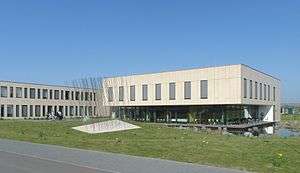Julius Kühn-Institut
Julius Kühn-Institut – Bundesforschungsinstitut für Kulturpflanzen (JKI) is the German Federal Research Centre for Cultivated Plants. It is a federal research institute and a higher federal authority divided into 15 specialized institutes. The JKI was named after the German agricultural scientist Julius Kühn (1825–1910).
| Federal Research Centre for Cultivated Plants Bundesforschungsinstitut für Kulturpflanzen | |
 | |
 Headquarters building in Quedlinburg | |
| Agency overview | |
|---|---|
| Formed | 2008 |
| Headquarters | Quedlinburg, Germany |
| Employees | 1,200 |
| Agency executive |
|
| Parent agency | Federal Ministry of Food and Agriculture |
| Website | http://www.jki.bund.de/ |
It was formed in January 2008 when three research centres in the Federal Ministry of Food and Agriculture merged:
- Federal Biological Research Centre for Agriculture and Forestry (BBA),
- Federal Institute for Plant Breeding Research on crops (BAZ) and
- Federal Agricultural Research Centre (FAL) (two institutes)
It has its main office at Quedlinburg and centres at Berlin, Braunschweig, Darmstadt, Dossenheim, Dresden-Pillnitz, Elsdorf, Groß Lüsewitz, Kleinmachnow, Münster and Siebeldingen.
Institutes
- Epidemiology and Pathogen Diagnostics (Quedlinburg and Braunschweig)
- Ecological Chemistry, Plant Analysis and Stored Product Protection (Quedlinburg, Berlin and Kleinmachnow)
- Resistance Research and Stress Tolerance (Quedlinburg)
- Biosafety in Plant Biotechnology (Quedlinburg)
- Breeding Research on Horticultural and Fruit Crops (Quedlinburg and Dresden)
- Breeding Research on Agricultural Crops (Quedlinburg)
- Application Techniques in Plant Protection (Braunschweig)
- Crop and Soil Science (Braunschweig)
- National and International Plant Health (Braunschweig)
- Plant Protection in Field Crops and Grassland (Braunschweig)
- Plant Protection in Horticulture and Forests (Braunschweig and Münster)
- Strategies and Technology Assessment (Berlin and Kleinmachnow)
- Biological Control (Darmstadt)
- Plant Protection in Fruit Crops and Viticulture (Dossenheim, Siebeldingen, Bernkastel-Kues)
- Grapevine Breeding (Siebeldingen)
- Experimental station for potato breeding (Groß Lüsewitz)
Notable scientists
gollark: The plague is *around* still, it just doesn't do much because sanitation is better.
gollark: But something something anthropic principle and populations were much more isolated until recently.
gollark: I did wonder a while ago why, if it was possible to have diseases which were both really lethal and contagious/airborne, humans were alive.
gollark: Can't wait for random people to be able to make custom diseases from the comfort of their home!
gollark: The great thing about bioweapons is that commercial DNA printing is quite cheap, and apparently mostly doesn't even defend against known sequences for e.g. smallpox (not that blacklisting works, really), and I believe there are papers describing how you can conveniently resurrect Spanish flu and such.
External links
- Website
- Julius Kühn Institute – Federal Research Institute for Cultivated Plants, Key to Nature wiki
This article is issued from Wikipedia. The text is licensed under Creative Commons - Attribution - Sharealike. Additional terms may apply for the media files.